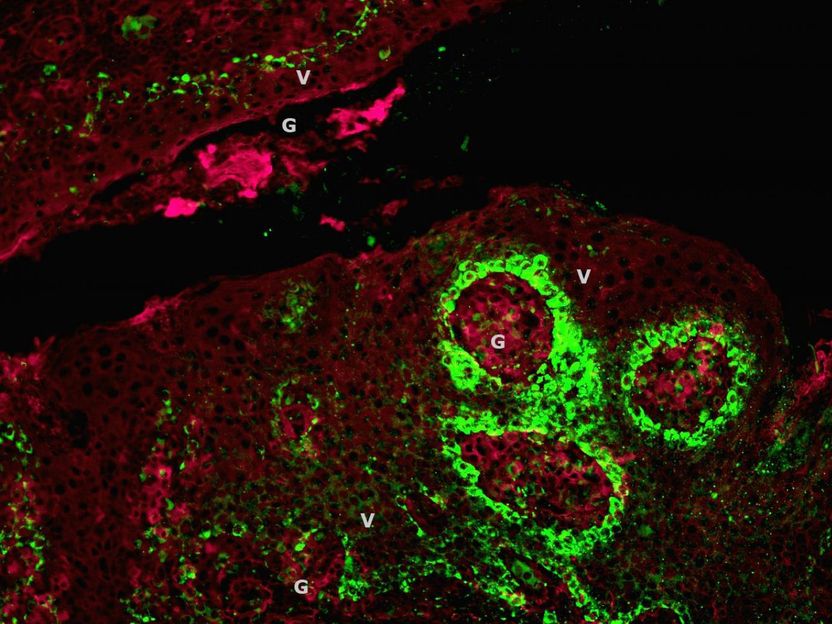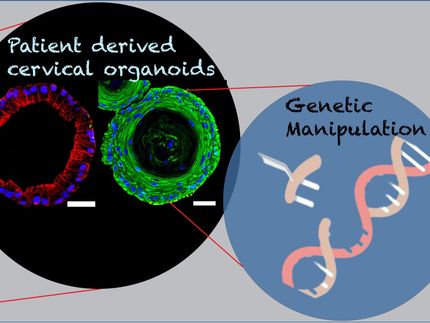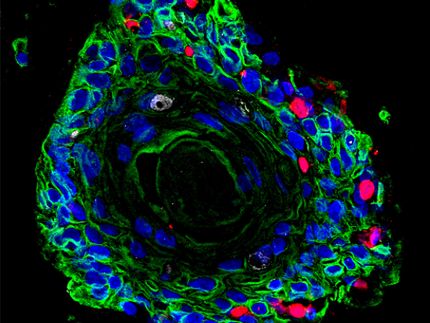HPV may lurk in your throat
Human papilloma virus (HPV), the culprit behind cervical cancer and some forms of head and neck cancer may hide in small pockets on the surface of tonsils in people not known to carry the virus. The finding, reported by University of Rochester Medical Center researchers, could be pivotal for the prevention of oropharyngeal cancers that form on the tonsils and tongue.

These are tonsil crypts with human papillomavirus (HPV; green) in epithelial and biofilm (red) layers ('V' = biofilm; 'G' = HPV; original magnification ×20).
Katherine Rieth. M.D.
By mid-adulthood, most people have been exposed to HPV. The same strains that cause cervical cancer (mainly HPV 16 and 18) cause head and neck cancers. While verified tests exist to detect HPV in people before they develop cervical cancer, the same is not true for HPV-related head and neck cancers, which are expected to outnumber cervical cancer cases by 2020.
Only about five percent of HPV-infected people will develop cancer of the mouth or throat, suggesting most people's immune systems can easily hold back HPV infections. Which begs the question, why doesn't the immune system protect the five percent who develop cancer?
Matthew Miller, M.D., associate professor of Otolaryngology and Neurosurgery at URMC believes the answer lies is biofilms - thin, slimy sheets of bacteria. He and his colleagues found HPV encased in biofilms inside pockets on the tonsil surface, called tonsil crypts, which is where HPV-related head and neck cancers often originate.
Miller and study co-author, Katherine Reith, M.D., an Otolaryngology resident at URMC, studied tissue samples from 102 patients who had elective tonsillectomies. Five of those samples contained HPV and four contained high risk strains, HPV 16 and 18. In every case, HPV was found in tonsil crypts biofilms.
The group believes HPV is shed from the tonsil during an active infection and gets trapped in the biofilm, where it may be protected from immune attack. In the crypts, the virus likely lays in wait for an opportunity to reinstate infection or invade the tonsil tissue to develop cancer.
"Given the lack of universal HPV immunization and the potential for the virus to evade the immune system even in individuals with detectable HPV in their blood, our findings could have far-reaching implications for identifying people at risk of developing HPV-related head and neck cancers and ultimately preventing them," Miller said.
Now, the team plans to investigate potential screening tools, such as an oral rinse, to detect HPV in the mouth and throat. The next step would be to develop topical antimicrobials that would disrupt the biofilm and allow the immune system to clear the virus.
While scientists still do not know if HPV vaccines reduce head and neck cancer, Miller recommends all young boys and girls receive a full course of the vaccinations. He hopes that better oral HPV screening tools will help determine the impact of the vaccine on these cancers.

























































